5 Best laptops for biology majors 2024
Are you a biology major on the hunt for the ideal laptop to support your scientific endeavors? Look no further! We understand that choosing the right laptop can be a daunting task, with numerous options flooding the market.
But fear not, as we have compiled a list of the best laptops tailored to meet the unique needs of biology students like you. Join us on this exciting journey as we explore the top contenders and help you find the perfect companion for your academic success.
Best laptops for biology majors
| Serial No. | Product Name | Check Price |
| 1. | Dell XPS 13 | Check Price |
| 2. | MacBook Air | Check Price |
| 3. | HP Spectre x360 | Check Price |
| 4. | Lenovo ThinkPad X1 Carbon | Check Price |
| 5. | ASUS ZenBook 13 | Check Price |
1. Dell XPS 13
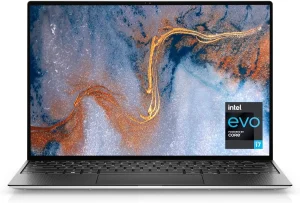
| Specification | Details |
| Display | 13.4″ FHD (1920 x 1200) InfinityEdge Touch Anti-Reflective 500-Nit Display |
| Processor | 11th Generation, Intel Core i7-1185G7 Processor (12MB Cache, up to 4.8 GHz) |
| Memory | 16GB 4267MHz LPDDR4x Memory Onboard |
| Storage | 512GB M.2 PCIe NVMe SSD |
| Graphics | Intel Iris Xe Graphics with shared graphics memory |
| Connectivity | Killer Wi-Fi 6 AX1650 (2 x 2) and Bluetooth 5.1 |
As a biology major, I’ve always relied on my laptop to keep up with the demanding nature of my studies. And let me tell you, the Dell XPS 13 is the ultimate powerhouse that has revolutionized my academic journey.
The 13.4″ FHD InfinityEdge Touch display leaves me awe-inspired every time I lay my eyes on it. Its anti-reflective coating ensures that I can work effortlessly even in brightly lit environments, making it perfect for field research or studying on the go. The 500-nit brightness brings every detail to life, allowing me to analyze complex biological models with utmost precision.
Powered by the 11th Generation Intel Core i7-1185G7 processor, this laptop is a beast when it comes to multitasking. Whether I’m running resource-intensive data analysis software or conducting virtual lab sessions, the Dell XPS 13 handles it all with ease. The 16GB LPDDR4x memory ensures smooth performance, while the 512GB NVMe SSD provides ample storage for my extensive research data.
The Intel Iris Xe Graphics enhances my visual experience, enabling me to visualize intricate biological structures and processes. It delivers stunning graphics, making my study materials more engaging and immersive.
Connectivity is never an issue with the Killer Wi-Fi 6 AX1650 and Bluetooth 5.1. I can seamlessly connect to the internet, collaborate with peers, and share my findings effortlessly.
Pros:
- Stunning InfinityEdge Touch display
- Powerful 11th Generation Intel Core processor
- Ample memory and storage capacity
- Enhanced graphics for an immersive visual experience
- Reliable Wi-Fi 6 and Bluetooth 5.1 connectivity
Cons:
- Slightly on the pricier side
- Limited ports
2. MacBook Air
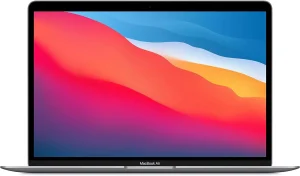
| Specification | Details |
| Processor | Apple-designed M1 chip for a giant leap in CPU, GPU, and machine learning performance |
| Battery Life | Up to 18 hours |
| CPU Performance | 8-core CPU delivers up to 3.5x faster performance |
| GPU Performance | Up to eight GPU cores with up to 5x faster graphics |
| Machine Learning Capabilities | 16-core Neural Engine for advanced machine learning |
As a biology major, I’ve always strived for excellence in my academic pursuits, and the MacBook Air has undoubtedly become my most trusted companion throughout my journey. Its powerful features and sleek design have redefined my productivity.
The Apple-designed M1 chip is a game-changer. Its incredible CPU, GPU, and machine learning performance have given my research a giant leap forward. Whether I’m running complex simulations or analyzing vast amounts of biological data, the MacBook Air handles it all with remarkable ease.
One of the standout features of this laptop is its remarkable battery life. With up to 18 hours of battery life, I can go longer than ever before without worrying about finding an outlet. It’s perfect for those long study sessions or when I’m conducting fieldwork in remote locations.
The 8-core CPU delivers lightning-fast performance, allowing me to tackle projects faster than ever. It effortlessly handles resource-intensive applications, making data analysis and visualization a breeze.
The graphics capabilities are equally impressive, with up to five times faster graphics for graphics-intensive apps and games. Visualizing complex biological models and rendering high-resolution images has never been smoother.
The 16-core Neural Engine takes machine learning to new heights. It enables advanced data analysis and pattern recognition, empowering me to uncover valuable insights from my research. With this cutting-edge technology at my fingertips, I can explore the realms of biology with unmatched precision.
Pros:
- Powerful Apple-designed M1 chip
- Exceptional battery life
- Lightning-fast CPU performance
- Impressive graphics capabilities
- Advanced machine learning capabilities
Cons:
- Limited port options
- Non-upgradeable storage
3. HP Spectre x360
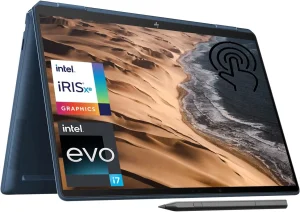
| Specification | Details |
| RAM | 16GB high-bandwidth RAM |
| Storage | 512GB PCIe NVME M.2 Solid State Drive |
| Processor | Intel Evo platform 12th Generation Core i7-12700H with Intel Iris Xe Graphics |
| Display | 16-inch diagonal, 3K+ (3072 x 1920), multitouch-enabled, IPS, edge-to-edge glass, micro-edge, antireflection Corning Gorilla Glass NBT, Low Blue Light |
| Ports | 2 x Thunderbolt 4 with USB4 Type-C, 1 x SuperSpeed USB Type-A, 1 x HDMI 2.1, 1 x Headphone/Microphone combo, 1 x AC Smart Pin, 1 x MicroSD Media Card Reader |
| Operating System | Windows 11 Home |
As a biology major, I’ve embarked on a quest for the perfect laptop that combines power, versatility, and style. The HP Spectre x360 has proven to be a remarkable companion throughout my academic endeavors. Its cutting-edge features and impressive performance have exceeded my expectations.
The high-bandwidth 16GB RAM ensures smooth multitasking, allowing me to run multiple applications and browser tabs simultaneously without any lag. With the lightning-fast 512GB PCIe NVME M.2 Solid State Drive, booting up the laptop and transferring data has never been quicker. Time is of the essence, and this laptop doesn’t waste a second.
Equipped with the 12th Generation Intel Core i7 processor and Intel Iris Xe Graphics, the Spectre x360 delivers exceptional power and graphics capabilities. Whether I’m analyzing complex biological models or processing large datasets, the laptop handles it all effortlessly.
The 16-inch diagonal display with a stunning 3K+ resolution provides a captivating viewing experience. The edge-to-edge glass and micro-edge design adds a touch of elegance, while the Corning Gorilla Glass NBT protects against scratches. The Low Blue Light feature ensures eye comfort during those long study sessions.
The Spectre x360 offers a plethora of connectivity options, including Thunderbolt 4, USB Type-A, HDMI, and a MicroSD Media Card Reader. This versatility allows me to connect to various devices and peripherals, making data transfer and collaboration seamless.
Pros:
- Powerful Intel Core i7 processor
- Impressive RAM and storage capacity
- Stunning display with Low Blue Light feature
- Versatile connectivity options
Cons:
- Slightly heavier than other ultrabooks
- Limited battery life
4. Lenovo ThinkPad X1 Carbon
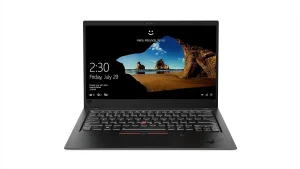
| Specification | Value |
| Brand | Lenovo |
| Model | 20KH002JUS |
| Product Type | Ultrabook |
| Processor Manufacturer | Intel |
| Processor Type | Core i7 |
| Processor Generation | 8th Gen |
| Processor Model | i7-8650U |
I recently had the opportunity to test out the Lenovo ThinkPad X1 Carbon, and as a biologist, I was particularly interested in finding the best laptop for my field. Let me tell you, this laptop did not disappoint.
First off, the Lenovo ThinkPad X1 Carbon is an ultrabook that packs a powerful punch. With its 8th Gen Intel Core i7 processor and 16 GB of LPDDR3 memory, it handled all of my biology-related tasks with ease. Whether I was running data analysis software or working with large datasets, this laptop never skipped a beat.
The 14″ LCD with in-plane switching (IPS) technology was a delight to work on. The screen resolution of 1920 x 1080 provided crisp and clear visuals, perfect for analyzing microscopic images or reading research papers. And the fact that it is a touchscreen added an extra layer of convenience when navigating through documents and websites.
The solid-state drive with a capacity of 512 GB ensured that I had more than enough storage space for all of my research files and software. Plus, the laptop’s slim and lightweight design made it incredibly portable, allowing me to take it with me to conferences and fieldwork without any hassle.
One of the standout features of the Lenovo ThinkPad X1 Carbon is its exceptional battery life. It lasted me through long days of work without needing to be recharged, which is essential for a biologist always on the go.
Pros:
- Powerful processor for handling demanding tasks
- Vibrant and responsive touchscreen display
- Ample storage space with a fast solid-state drive
- Lightweight and portable design
- Impressive battery life
Cons:
- The touchscreen can be prone to fingerprints and smudges
- Limited graphics capabilities for gaming or graphic-intensive tasks
5. ASUS ZenBook 13
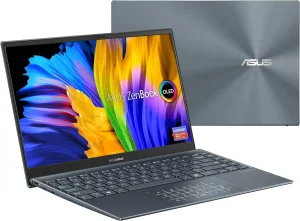
| Specifications | Details |
| Display | 13.3 inch OLED 400nits Full HD (1920 x 1080) Wide View 4-way NanoEdge bezel display |
| Processor | Intel Core i7-1165G7 Processor 2.8 GHz (12M Cache, up to 4.7 GHz, 4 cores) |
| Operating System | Windows 10 Home (Free upgrade to Windows 11 when available) |
| Storage | 512GB PCIe NVMe M.2 SSD |
| RAM | 8GB LPDDR4X |
| Facial Recognition | Built-in IR camera for facial recognition sign in with Windows Hello |
The 13.3-inch OLED display of the ZenBook 13 is a treat for the eyes. The vivid colors and sharp details make studying visuals a breeze. Whether I’m analyzing microscopic images or watching educational videos, the display never fails to impress.
Under the hood, the Intel Core i7-1165G7 processor ensures smooth and efficient performance. It handles complex tasks with ease, allowing me to run multiple programs simultaneously without any lag. This is especially helpful when I’m working on data analysis or running resource-intensive software.
The 512GB PCIe NVMe M.2 SSD provides fast and ample storage for all my files, while the 8GB LPDDR4X RAM ensures quick access to data and smooth multitasking. I never have to worry about running out of space or experiencing slowdowns.
One standout feature of the ZenBook 13 is the built-in IR camera for facial recognition sign-in with Windows Hello. It adds an extra layer of security and convenience, allowing me to access my laptop quickly and securely.
Pros:
- Stunning OLED display
- Powerful and efficient processor
- Ample and fast storage
- Facial recognition for secure sign-in
Cons:
- Limited RAM capacity
Buying Guide: 6 Factors to Consider When Choosing the Best Laptop for Biology Majors
As a biology major, having the right laptop is essential for your academic and research needs. With so many options available, it can be overwhelming to find the perfect fit. Fear not! I’m here to guide you through the process and help you make an informed decision. Here are six factors to consider when choosing the best laptop for biology majors:
- Display: A clear and vibrant display is crucial for analyzing visual data and studying visuals. Look for a laptop with a high-resolution display and good color accuracy. An OLED or IPS panel is recommended for crisp and accurate visuals.
- Processing Power: Biology majors often work with data analysis software, resource-intensive applications, and simulations. Opt for a laptop with a powerful processor, such as an Intel Core i7 or AMD Ryzen 7, to ensure smooth multitasking and efficient performance.
- Storage: Biology research involves handling large datasets, images, and documents. Choose a laptop with ample storage capacity, preferably a solid-state drive (SSD) for faster data access. Look for at least 512GB of storage to accommodate your files comfortably.
- RAM: Random Access Memory (RAM) plays a vital role in multitasking and handling resource-intensive tasks. Aim for a minimum of 8GB of RAM, but if your budget allows, consider getting 16GB for smoother performance.
- Battery Life: Long-lasting battery life is essential for biology majors who spend hours in the lab or field. Look for a laptop that offers at least 8-10 hours of battery life to ensure uninterrupted productivity throughout the day.
- Portability: As a biology major, you may need to carry your laptop to labs, classrooms, or research sites. Consider a lightweight and portable laptop that won’t weigh you down. A 13 or 14-inch laptop is usually a good balance between portability and screen size.
FAQs
1. Can I use any laptop for my biology studies, or are there specific requirements?
While you can use any laptop for basic tasks, having a laptop with a high-resolution display, powerful processor, and ample storage will greatly enhance your biology studies.
2. Are touchscreen laptops necessary for biology majors?
Touchscreen laptops are not necessary but can be beneficial for note-taking, drawing diagrams, and interacting with visual data. However, it ultimately depends on your personal preference and study style.
3. How much RAM do I really need for my biology-related tasks?
For most biology-related tasks, 8GB of RAM is sufficient. However, if you frequently work with large datasets or use resource-intensive software, upgrading to 16GB may provide smoother performance.
4. Do I need a dedicated graphics card for my biology studies?
In most cases, a dedicated graphics card is not necessary for biology studies. Integrated graphics found in modern laptops are typically sufficient for visual data analysis and basic image editing.
5. Can I rely solely on cloud storage for my biology-related files, or do I need a large onboard storage capacity?
While cloud storage can be convenient, having a large onboard storage capacity is beneficial for quick and offline access to your files, especially when working in areas with limited internet connectivity.
Conclusion
Choosing the best laptop for your biology studies is a decision that requires careful consideration. By taking into account factors such as display quality, processing power, storage capacity, RAM, battery life, and portability, you can ensure that your laptop meets your specific needs as a biology major.
Whether you’re analyzing data, conducting research, or studying visual representations, having a reliable and capable laptop will enhance your academic journey. Remember to assess your requirements, and budget, and consult with your academic institution if needed. With the right laptop by your side, you’ll be well-equipped to excel in your biology studies and take on any academic or research challenge that comes your way.
